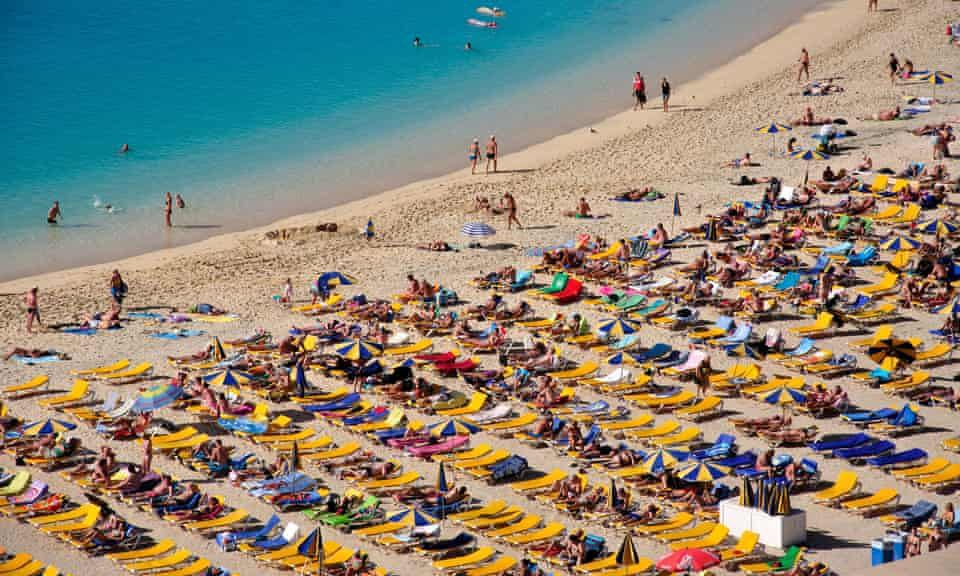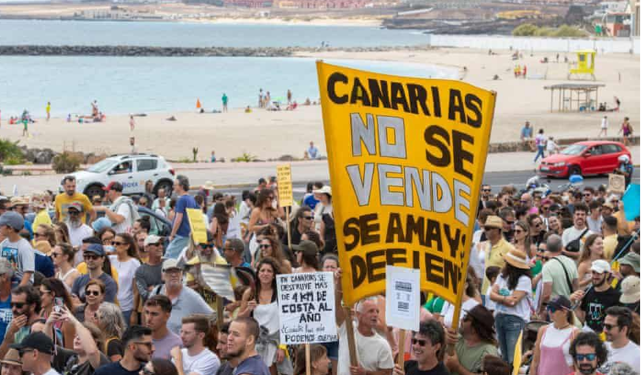Mass Protests Erupt in the Canary Islands, Demanding Sustainable Tourism – In a powerful display of unity, tens of thousands of citzens have taken to the streets across the Canary Islands, demanding an immediate reassessment of the region’s tourism strategy and a cap on visitor numbers. These impassioned protestors argue that the existing tourism model, which has been in place for decades, has rendered life unaffordable for residents and poses a grave threat to the environment’s sustainability.
Under the rallying cry “Canarias tiene un límite” (The Canaries have a limit), the protests have garnered support from influential environmental organizations, including Greenpeace, WWF, Ecologists in Action, Friends of the Earth, and SEO/Birdlife. The collective Canarias se Agota (The Canaries Have Had Enough) played a pivotal role in coordinating the demonstrations across all eight islands.
“Preserving the Canary Islands nature and coastal communities quality of life through Sustainable Tourism”
The urgency behind these protests has been further amplified by eleven members of Canarias se Agota, who have embarked on a week-long hunger strike. Their hunger strike serves as a direct protest against the construction of two expansive luxury developments in southern Tenerife, which they deem illegal and entirely unnecessary.
While police estimate the number of protestors at 20,000, organizers contend that the figure is closer to 50,000, as reported by Spain’s TVE public television. The demonstrations have garnered support beyond the archipelago, with solidarity protests taking place in Madrid and Barcelona.
The Canary Islands, with a population of 2.2 million, welcomed 13.9 million tourists last year alone. Tourism constitutes approximately 35% of the archipelago’s GDP, contributing a staggering €16.9 billion in 2022. However, locals argue that this reliance on tourism is straining the region’s natural resources and driving up rental prices, making it increasingly unaffordable for residents.
Statistics from Spain’s National Statistics Institute reveal that 33.8% of individuals in the Canaries are at risk of poverty or social exclusion, second only to Andalucía in terms of regional proportions. This alarming statistic underscores the consequences of persisting with a tourism-focused approach, particularly when faced with the pressing challenges of the climate emergency and water shortages.
The protests in the Canary Islands underscore a growing global concern: the perils of over-tourism.
Victor Martín, the spokesperson for Canarias se Agota, highlights the incongruity of prioritizing tourism while grappling with water scarcity. He notes that urban areas catering to tourists are experiencing a surge in demand, even as a water crisis looms. The situation on Tenerife is particularly dire, with a water emergency already declared due to a dry winter.
The housing situation in the archipelago compounds the crisis, as exorbitant prices, low wages, a dearth of public housing, and the cost of living crisis leave many residents in dire straits. Martín shares stories of hotel maids and waiters forced to live in shacks due to meager wages that fail to cover basic living costs, a predicament exacerbated by the global crisis that has necessitated the importation of essential goods.

Martín emphasizes that the protest movement is not anti-tourist, acknowledging the long-standing relationships forged between Canarian residents and generations of families from countries like the UK and Germany. The focus, he asserts, should be on the flawed model that serves the interests of a business class resistant to change, while politicians favor these select few over the broader citizenry.
According to Martín, a comprehensive overhaul of the Canary Islands’ tourism model cannot be delayed. He outlines two primary demands: an immediate halt to the two controversial mega-projects in Tenerife and a tourism moratorium to evaluate the carrying capacity of each island. This evaluation would determine whether the region has already surpassed its critical point. In areas experiencing excessive strain, a controlled reduction in economic activity would be implemented to safeguard natural resources. Without such measures, the existing model will continue to benefit only a privileged few.
By reevaluating the tourism model and embracing sustainability, the Canary islands have the potential to become a beacon of sustainable tourism development, shifting their image from negative to positive.
Mass Protests Erupt in the Canary Islands, Demanding Sustainable Tourism








